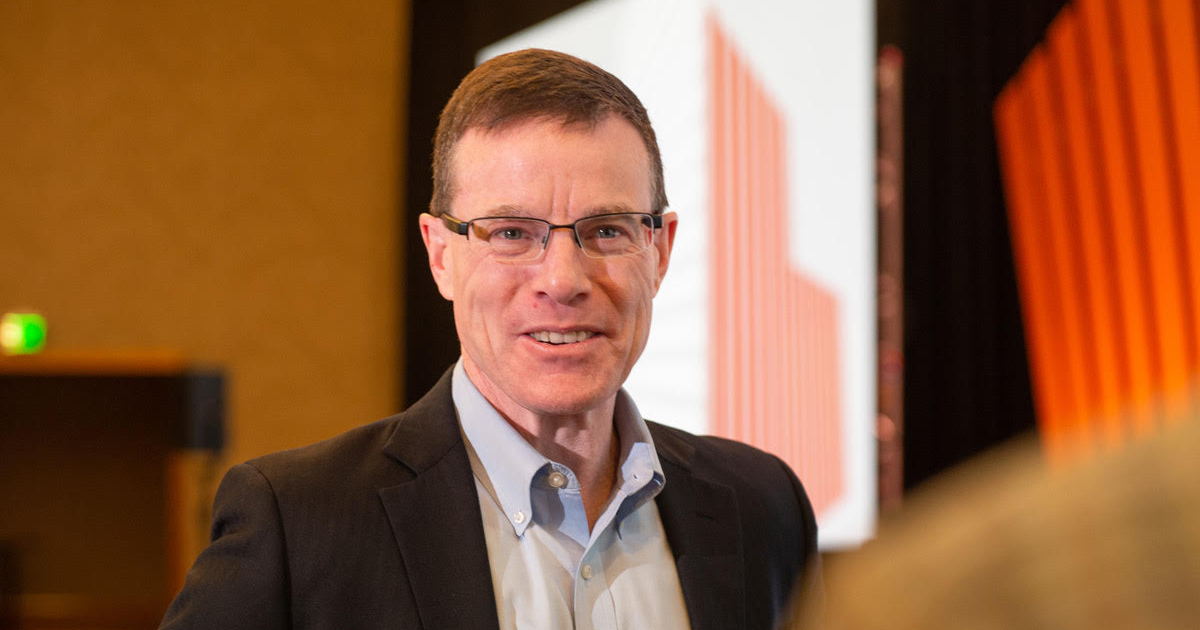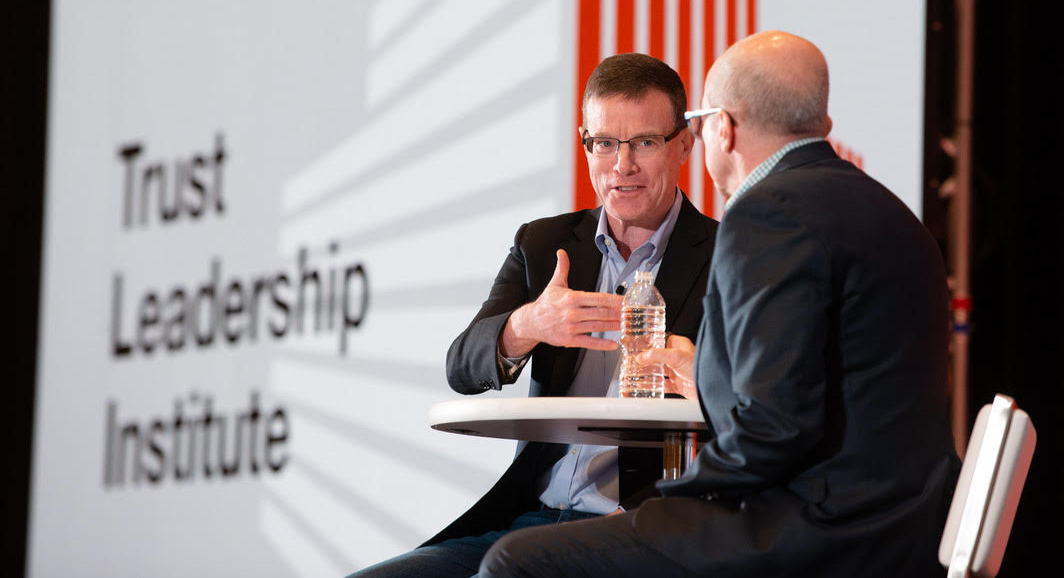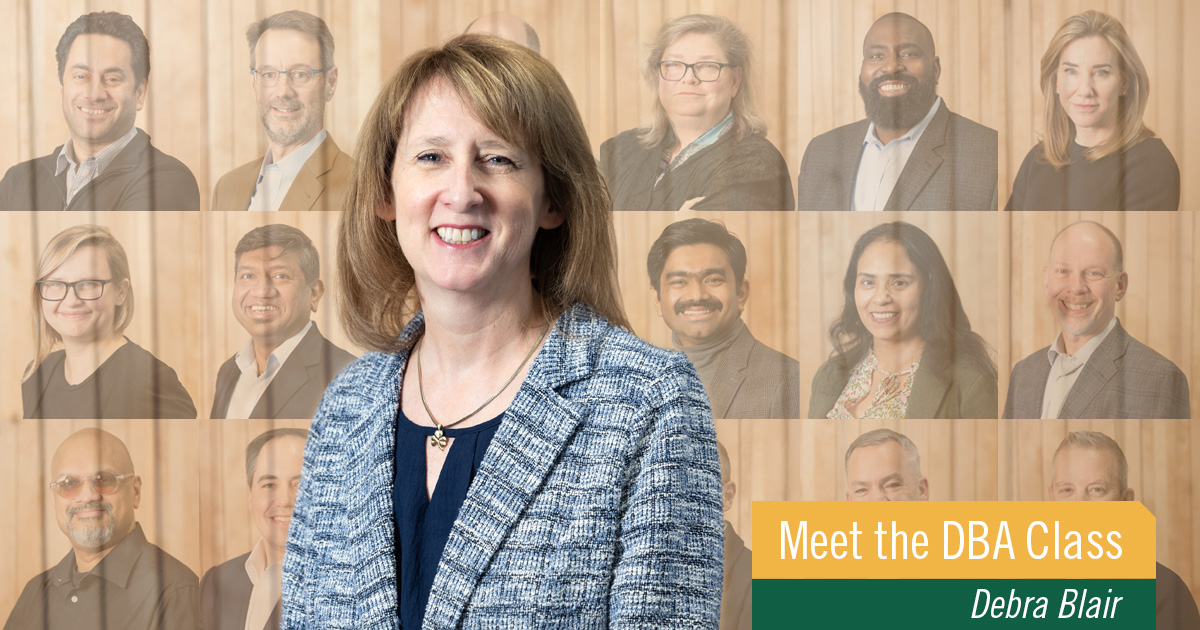Tim Ryan ’88 on Building Trust at Your Organization

In his first week as the U.S. chair and senior partner at PwC, Tim Ryan ’88 received an email that changed how he originally viewed his new job. It was early July 2016, and the fatal shootings of Philando Castile and Alton Sterling, along with the shooting of police officers in Dallas, dominated the news.
As a corporate response, Ryan sent out an email to the entire firm outlining PwC’s commitment to its employees. “I received thousands of replies, but one reply stood out to me the most: ‘The silence was deafening,’ ” Ryan says.
In response to the callout and an obvious need for more than just an email, the firm shut down for a day for all employees to have an honest conversation about race.
“I realized if we had 50,000 people who could walk through our doors but felt they couldn’t share what was on their minds, we wouldn’t be able to give our best selves to our clients,” he says. “We learned so much about the experience of our Black colleagues that day that we likely would not have had the chance to learn otherwise.”
What came next was a shift in how leadership at PwC addressed diversity and inclusion in the workplace as well as how leadership and associates communicated. Ryan prioritized trust and discussion across the organization and began initiatives to build a culture of belonging. It is an ethos that guides Ryan, who has worked at PwC since 1988, as he in turn guides his company through the latter half of a tumultuous decade.
It also will be top of mind for Ryan this month when he addresses a new cohort of young professionals as the undergraduate speaker at the 2023 Babson Commencement ceremony.
Addressing a Changing Landscape
As Generation Z becomes a larger presence in the workforce, fostering a workplace in which employees feel welcome, supported, and safe is becoming increasingly important. According to a 2020 Monster survey, 83% of Gen Z candidates cite a company’s commitment to diversity and inclusion as important when choosing a place to work.
The importance will only grow. The 2022 Career Interest Survey from the National Society of High School Scholars (NSHSS), which surveyed more than 11,000 high school and college-aged individuals, named “fair treatment of all employees” as the most important determinant when picking an employer.
Ryan recommends young professionals looking to be understood and heard at work to find someone they can trust in their organization, but he emphasizes that the road goes both ways.
“As a leader, you need to have a strong plan, but being able to listen, learn, and adjust your plan based on what is happening around you is key to staying relevant and building trust.”
Tim Ryan, U.S. chair and senior partner at PwC
“Managers have a very important responsibility to lead with an inclusive mindset and to help create a culture of belonging,” he says. “The employee has to feel comfortable enough to share the information and trust that who they share it with is going to be there for them—whether that be a listening ear, sharing similar experiences, or helping to get the issue corrected.”
In support of this mindset, the Access Your Potential program at PwC supports Black and Hispanic/Latinx college students through mentorship, upskilling, and general career access. The program has a career-readiness platform where students can learn more about PwC and other organizations committed to advancing diversity, equity, and inclusion within their workplaces.
Additionally, the While You Work CPA Acceleration Program gives college students and graduates the opportunity to receive a tuition-paid, industry-recognized master’s degree, while working part time at PwC. PwC also launched Thrive in 2020, a program that supports associates in their first two years at PwC by providing a foundation in leadership development and relationship building.
Building an Environment of Trust
“We have not looked back since.”
Since that week in 2016, Ryan has used his position as a thought leader to redefine the role leadership can play in fostering trusting, inclusive environments for employees in and outside PwC.

Tim Ryan ’88 provides resources and leadership to help managers across the corporate world build trust in their organizations.
He publishes a newsletter on trust on LinkedIn, titled “Talking Trust with Tim Ryan,” and in 2017, he took his work outside of PwC by founding the CEO Action for Diversity & Inclusion. It is a group of 2,400 CEOs that represents more than 21 million employees, committed to creating more inclusive work cultures.
That includes helping CEOs set diversity, equity, and inclusion goals and report them honestly—avoiding acquisitions of lip service. “Sometimes you may not have made the progress you thought you would, and in those cases, it is especially important to be transparent,” Ryan says. “Explain what you have achieved and the steps you are planning to take to fully reach your goal. This type of transparency will help you build trust with your stakeholders.”
PwC also created the CEO Action for Racial Equity to promote scalable, sustainable policies and corporate best practices to address systemic racism and social injustice.
Each initiative is an integral part of the trust puzzle, but they aren’t the complete picture. As norms shift and tragedy strikes, companies and leaders will need to continue to put their employees first.
“As a leader, you need to have a strong plan, but being able to listen, learn, and adjust your plan based on what is happening around you is key to staying relevant and building trust,” Ryan says. “Those early days in my senior partner tenure were a very important pivot of my career. I am proud of the work we’ve done around diversity, equity, and inclusion and continue to do.”




